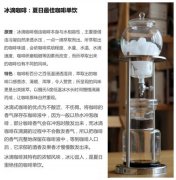Nine misunderstandings about coffee common sense of drinking coffee
Coffee is the first pick-me-up for many people, but many people think that in addition to refreshing, drinking coffee is not good, but will cause great harm to the body. There are still many misunderstandings about the efficacy of coffee. Let's take a look at it with the editor.

Misunderstanding one, drinking coffee will make you fat?
Coffee is good for the skin. Coffee can promote metabolic function, activate digestive organs, and has a great effect on constipation. Taking a bath with coffee powder is a kind of thermotherapy, which has the effect of losing weight.
Misunderstanding 2, drinking coffee is not conducive to sleep, increase fatigue?
Coffee can relieve fatigue. In order to eliminate fatigue, we must supplement nutrition, rest and sleep, and promote metabolic functions, and coffee has these functions.
Misunderstanding 3, drinking coffee will suffer from gallstones?
Three cups of coffee a day can prevent gallstones. For caffeinated coffee, it stimulates gallbladder contraction and reduces cholesterol, which is prone to gallstones. The latest Harvard University researchers found that men who drank two to three cups of coffee a day were less than 40% likely to get gallstones.
Myth 4. Will drinking coffee have a negative effect on people's mood?
The influence of coffee on mood. Experiments show that the average person absorbs 300 milligrams of caffeine (about 3 cups of brewed coffee) a day, which has a good effect on a person's alertness and mood.
Myth 5. Does drinking coffee increase the risk of diabetes?
The researchers found that drinking coffee reduced the risk of developing Ⅱ diabetes in postmenopausal women. Women who drank six cups of coffee a day were 22 per cent less likely to develop Ⅱ diabetes than those who drank less than six cups a day, or even none, and those who regularly drank low caffeine were 33 per cent less likely to develop the disease. So-called Ⅱ diabetes is the most common type of diabetes. 95% of diabetics belong to Ⅱ diabetes, and the peak onset of the disease is between 40 and 55 years old. Obesity may also lead to early onset.
According to the researchers, it may be that coffee contains special chemicals that can effectively lower blood sugar. However, some diabetes specialists have questioned the claim of the study, saying that there are many causes of diabetes and that the effects of coffee drinking on the disease need to be studied in more detail.
Misunderstanding 6. Drinking coffee is bad for intestines and stomach.
Caffeine stimulates the sympathetic nerve, stimulates stomach and intestines to secrete gastric acid, promotes evolution, prevents gastric distension and gastroptosis, and promotes gastrointestinal hormones and peristaltic hormones.
Misunderstanding 7. Drinking coffee is bad for cardiovascular system.
Coffee contains linoleic acid, which has hemolysis and prevents thrombosis, enhances vasoconstriction, promotes blood circulation, and relieves vasodilation headaches, especially migraines. In addition, it can promote venous reflux, moisturize the skin, restore the elasticity of the muscle surface and prevent cardiovascular disease.
Myth 8. Drinking coffee is not good for asthma.
Caffeine promotes the sympathetic nerve, suppresses the parasympathetic nerve, and avoids asthma caused by parasympathetic nerve excitement.
Misunderstanding 9. Drinking coffee often leads to a stroke?
Coffee can increase high-density cholesterol, accelerate the metabolism of bad cholesterol, reduce atherosis of coronary arteries, and reduce the risk of stroke.
Important Notice :
前街咖啡 FrontStreet Coffee has moved to new addredd:
FrontStreet Coffee Address: 315,Donghua East Road,GuangZhou
Tel:020 38364473
- Prev

The charm of making an iced cup of coffee in ten hours
Coffee is not only refreshing, the rich aroma that permeates the air, is the best companion for music, books and slow life. As an art lover, have you abandoned instant coffee and advanced to drinking freshly brewed fancy coffee with milk and sugar? However, the small group of people who know how to drink coffee best have thrown the fancy coffee drinker out of the street and started drinking without sugar.
- Next

Development History of Japanese Cafe and Foreign Cafe
Japanese Cafe lithographic poster Edward Funier Japan Cafe is a song and dance nightclub in Montmartre where Parisian artists gather. In 1893, the place was redecorated and incorporated into the very fashionable Japanese style and lanterns of the time. In order to attract customers to attend the opening ceremony of the nightclub, cafe owner Edward Funier customized it from Lautrek.
Related
- Beginners will see the "Coffee pull flower" guide!
- What is the difference between ice blog purified milk and ordinary milk coffee?
- Why is the Philippines the largest producer of crops in Liberia?
- For coffee extraction, should the fine powder be retained?
- How does extracted espresso fill pressed powder? How much strength does it take to press the powder?
- How to make jasmine cold extract coffee? Is the jasmine + latte good?
- Will this little toy really make the coffee taste better? How does Lily Drip affect coffee extraction?
- Will the action of slapping the filter cup also affect coffee extraction?
- What's the difference between powder-to-water ratio and powder-to-liquid ratio?
- What is the Ethiopian local species? What does it have to do with Heirloom native species?

